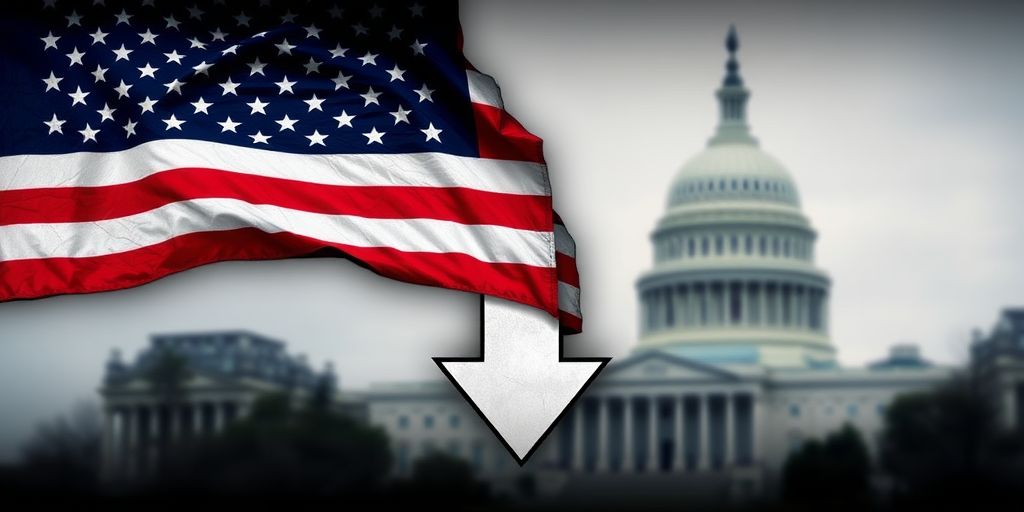Banking
US Credit Rating Downgraded by Moody’s: A Wake-Up Call for Fiscal Responsibility

Moody’s Investors Service has downgraded the United States’ credit rating from the highest possible level of Aaa to Aa1, citing concerns over the nation’s escalating debt and fiscal management. This marks a significant shift in the financial landscape, as the U.S. now joins other major economies that have faced similar downgrades.
Key Takeaways
- Moody’s downgraded the U.S. credit rating to Aa1, the last major agency to do so.
- The downgrade reflects rising national debt, projected to reach 134% of GDP by 2035.
- Political gridlock has hindered effective fiscal policy, contributing to increasing deficits.
- The downgrade may lead to higher borrowing costs for the government and impact investor sentiment.
Background of the Downgrade
Moody’s decision comes amid a backdrop of rising federal debt, which has surpassed $36 trillion. The agency highlighted that successive administrations have failed to implement measures to curb the growing fiscal deficits, which are expected to widen significantly in the coming years. The current fiscal deficit is projected to reach nearly 9% of GDP by 2035, up from 6.4% in 2024.
The downgrade follows similar actions by other credit rating agencies, including Standard & Poor’s in 2011 and Fitch Ratings in 2023, both of which cited concerns over fiscal management and political instability.
Implications for the Economy
The downgrade is likely to have several implications for the U.S. economy:
- Increased Borrowing Costs: Investors may demand higher yields on U.S. Treasury bonds, reflecting the perceived risk associated with the downgraded rating.
- Investor Sentiment: The downgrade could dampen confidence in U.S. financial markets, leading to volatility in stock and bond prices.
- Political Pressure: Lawmakers may face increased pressure to address fiscal issues, including potential cuts to spending or reforms to tax policies.
Political Reactions
The downgrade has sparked a range of reactions from political leaders:
- Democratic Leaders: Senate Democratic Leader Chuck Schumer called the downgrade a wake-up call for Republicans to reconsider their approach to fiscal policy, particularly regarding tax cuts that exacerbate the deficit.
- Republican Response: Some Republican leaders have criticized Moody’s decision, arguing that it reflects political bias rather than economic reality. They maintain that extending tax cuts will stimulate growth and ultimately improve fiscal health.
Future Outlook
Looking ahead, the U.S. faces significant challenges in managing its fiscal trajectory. The current political climate, characterized by division and gridlock, complicates efforts to implement necessary reforms. Analysts suggest that without a credible plan to reduce deficits, the U.S. may continue to face downgrades and increased borrowing costs.
In conclusion, Moody’s downgrade serves as a critical reminder of the importance of fiscal responsibility. As the U.S. navigates its economic future, addressing the underlying issues of debt and deficit will be essential to restoring confidence among investors and maintaining the nation’s financial standing on the global stage.
Sources
- Moody’s strips U.S. government of top credit rating over failure to rein in debt, PBS.
- Moody’s lowers U.S. credit rating to ‘Aa1’, CNBC.
- Moody’s downgrade intensifies investor worry about US fiscal path, Reuters.
- With Moody’s downgrade, US loses treasured Aaa credit rating, Reuters.
- Moody’s cuts America’s pristine credit rating, citing rising debt, Reuters.
-

 Foreign Policy5 days ago
Foreign Policy5 days agoInside Schedule F: Will Trump’s Federal Workforce Shake-Up Undermine Democracy?
-

 Press Release5 days ago
Press Release5 days agoIn2space Launches Campaign to Make Space Travel Accessible for All
-

 Press Release9 hours ago
Press Release9 hours agoNura Labs Files Revolutionary Patent: AI-Powered Wallet Solves the $180 Billion Crypto Staking Complexity Crisis















